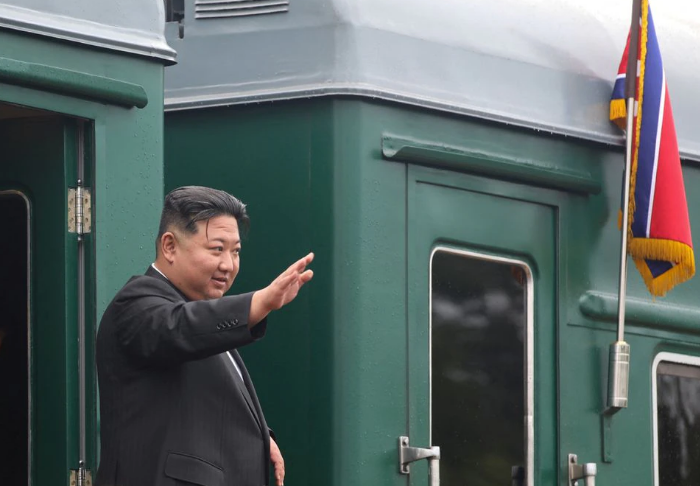Upon his return to North Korea from his diplomatic summit with Russian President Vladimir Putin, North Korean leader Kim Jong Un is expected to carry back a collection of gifts from his Russian hosts. While these gifts may include items like a Russian-made rifle, a cosmonaut’s glove, and advanced military drones, their possession constitutes a clear violation of United Nations sanctions imposed on North Korea due to its illicit missile and nuclear activities.
The North Korean leader is known to keep these gifts in a dedicated “friendship” museum, where presents received by North Korea’s three successive leaders—Kim Jong Un, his father Kim Jong-il, and his grandfather and state founder Kim Il Sung—are showcased.
Gifts From Russia: Among the notable presents received from Russia is a high-quality Russian-made rifle, as confirmed by Kremlin spokesman Dmitry Peskov. In return, Kim Jong Un reciprocated with a rifle crafted by North Korean artisans. Additionally, Putin presented a glove worn in space, adding a touch of space exploration to the collection. Governor Oleg Kozhemyako of the Primorsky region gifted Kim with modern and lightweight body armour designed for assault operations, protecting the chest, shoulders, throat, and groin.
In a potentially more contentious violation of U.N. sanctions, Kim was also presented with five one-way attack drones and a Geranium-25 reconnaissance drone, a type widely utilized in the ongoing conflict in Ukraine, as reported by TASS.
Despite Moscow’s vote in favour of U.N. Security Council resolutions against North Korea, which included sanctions related to its banned missile and nuclear activities, these gifts are sure to raise concerns on the international stage.
Fur Hat and Other Items: During his visit to Vladivostok, Kim Jong Un received a fur hat from Russian Defence Minister Sergei Shoigu. A humorous anecdote emerged regarding the hat’s size, as Russia’s ambassador to Pyongyang, Alexander Matsegora, initially suggested a size slightly smaller than his own “very large head,” which turned out to be a perfect fit. Ambassador Matsegora noted that the hat was a heartfelt gift that greatly pleased the North Korean leader.
In the border town of Khasan, Kim received a photo of Yuri Gagarin, the iconic cosmonaut who became the first human to orbit the Earth, as a token of Russian hospitality.
International Friendship Exhibition: North Korea has long showcased the gifts received by its leaders, dedicating a special museum known as the International Friendship Exhibition. Located in the picturesque hills of the Myohyangsan mountain, approximately 160 kilometres (99 miles) from Pyongyang, this museum consists of two impressive concrete structures featuring traditional architectural elements with blue-tiled roofs.
Established in 1978, the museum boasts more than 100 showrooms displaying over 115,000 items gifted from over 200 countries. The sheer scale and significance of this collection have led North Korean state media to draw comparisons with the Louvre in Paris.
Past Gifts and Propaganda: The museum’s diverse collection includes crystalware gifted by former U.S. President Jimmy Carter, a teacup set from French President Francois Mitterrand, a basketball signed by Michael Jordan, a present from former U.S. Secretary of State Madeleine Albright during her visit in 2000. Additionally, a rifle from the late Cuban leader Fidel Castro is among the notable items.
The display of gifts from South Korea is heavily influenced by propaganda, with prominent placement given to a large-screen television set presented by former South Korean President Kim Dae-Jung, known for his peace policies toward North Korea.
One of the standout gifts is the Dynasty sedan, the flagship vehicle of Hyundai Motor, which was bestowed upon Kim Jong-il by Chung Ju-yung, the North Korean-born founder of the Hyundai Group. This gesture followed significant North Korean investment by Chung Ju-yung after the historic 2000 inter-Korean summit.
Kim Jong Un’s recent collection from Russia is expected to join this extensive array of gifts, serving as a testament to the diplomatic interactions, however controversial, between North Korea and the rest of the world.








 India
India












